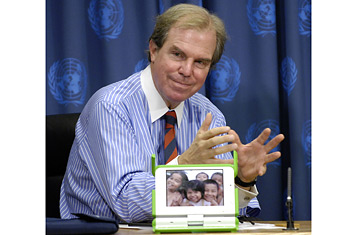
Nicholas Negroponte
Rome wasn't built in a day, but that's all the time that Nicholas Negroponte has for the Eternal City right now. As he's done for the past three years, the founder and chairman of the non-profit One Laptop Per Child foundation has touched down in one world capital after another to pitch his innovative and audacious project to government leaders, curious techies, education advocates, NGOs and anyone else who will listen. But even as he was criss-crossing Rome in a hectic 14 hours earlier this week, Negroponte's attention was fixed on a factory near Shanghai. That's where within a week — after all the development and design and gigabytes of both hype and scepticism — mass production will begin on the state-of-the-art, low-price computer that its backers are billing as nothing less than the most ambitious education project in world history. "We are blasting off," Negroponte said, as his car rolled through downtown Rome between appointments. "I can look at everything I've done in my life, and it was somehow all pointing to this."
The Big Idea of Professor Negroponte — co-founder in 1985 of MIT's influential Media Lab — is the development and distribution of a high-quality, low-cost laptop to potentially hundreds of millions of children throughout the developing world.
The first task was to design a machine that would allow kids to connect wirelessly to the Internet without an outside source of electricity, and that would be rugged enough to function in often harsh conditions. Prototypes of the laptop (dubbed XO) — with built-in video and audio, a hand-crank and low wattage requirements — are getting high marks from technology reviewers. Some 8,000 units are up and running in pilot villages from Cambodia to Uruguay. But perhaps an even more difficult task was to generate enough mass interest in the project to allow the computer to be produced on such a vast scale that costs could be kept down. The program's chief education officer, Argentine neurology professor Antonio Battro, who accompanied Negroponte in Rome, says providing laptops to entire villages and nations of children should be viewed like vaccination programs. "This the first time ever that education can become 'big science,'" Battro said, comparing One Laptop Per Child in its potential scope and impact to the human genome project. Negroponte confesses to "bluffing" on the original numbers to create momentum for the project. "You need scale to change people's minds," he said. "We must create an avalanche."
Though Negroponte and his project are not quite there yet, the 63-year-old professor is as busy as ever piling up the snow. Such was the case Monday in Rome, where he was utilizing the most important new tool in his stump speech: the lime green laptop with a toy-like design that Negroponte carries with him everywhere. Throughout the day, he spoke to three packed auditoriums, and met with officials at the U.N.'s Rome-based Food and Agriculture Organization, the Vatican's Pontifical Academy of Sciences and Telecom Italia. In between, he taped an interview at Vatican Radio, lunched with two top advisers to Italian Prime Minister Romano Prodi, reviewed strategy with his own staff and fielded a proposal to distribute the computers in Florence and some of its 20 sister cities around the world. Prodi has committed Italy to donating 50,000 of the laptops to Ethiopia, while the Vatican potential is particularly enticing, with some 50 million schoolchildren in Catholic schools around the world.
Still, the skeptics remain, noting for example that the price tag of what was once billed as a $100 laptop is now closer to $200. Moreover, the original strategy of getting six of the largest developing countries — Argentina, Brazil, Pakistan, Thailand, Nigeria and Libya — to commit to buying one million units stalled in August. The governments in China and India have also been resistant, convinced that they can do something similar on their own. Negroponte's response has been to open up the program to individuals and companies, launching in mid-November in the United States a "Give One, Get One" program that will ask people to pay $400 for two XO's, one of which they will receive and the other to be sent to a poor child.
Taiwan-based laptop manufacturer Quanta will begin by turning out 44,000 units a week at a recently expanded factory in Changshu, northwest of Shanghai. Negroponte said some 300,000 orders have been booked so far. The goal is to be turning out a million laptops a month by mid-2008. That avalanche, the critics will say, better start rolling soon. But Negroponte doesn't seem to mind the doubters. Four years ago, he ran into Michael Dell, founder and CEO of Dell computer makers at the World Economic Forum and told him — again — about his concept for making inexpensive computers for all the world's poor children. Recalled Negroponte: "He said: 'Nicholas, you tell me that every time I see you. But you know what? It's impossible.'" With a sly grin, Negroponte adds: "When you tell me something's impossible, that's going to make me want to try."
